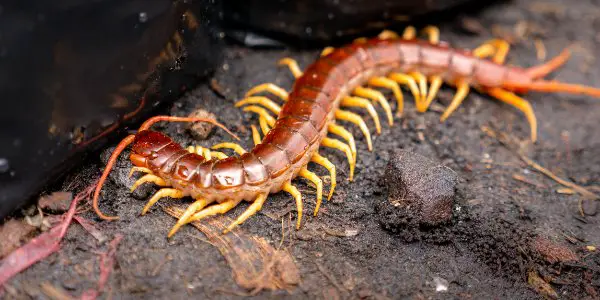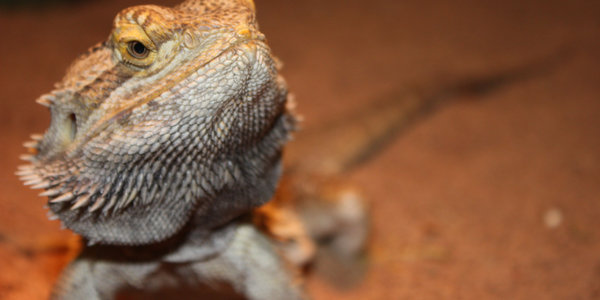Scientifically known as Pogona vittiveps, bearded dragons are becoming a popular choice among pet owners who would like the experience of keeping a pet lizard.
Among other reasons, most reptile pet owners prefer them because of their long lifespan and hardiness.
As with all other pets, knowing what to feed the animal is vital for providing it with excellent care. Bearded dragons feed on an omnivorous diet.
Given that these reptiles are naturally adapted to wild living, you are bound to wonder, what can I give my bearded dragon? Are all worms safe for bearded dragons?
Can bearded dragons eat centipedes?
Bearded dragons can eat centipedes. However, since some species of centipedes are poisonous, it is best to avoid giving your bearded dragon this insect altogether. It might be hard to distinguish the toxic centipedes from the non-poisonous ones, and you definitely don’t want to risk your beardie’s life.
Many centipede species exist, and they vary in different characteristics such as size, number of pairs of legs, etc. They have claw-like body parts on their tiny mouths that have a venomous gland.
Centipedes are carnivorous and often forage in search of food during the night. These creatures use their venomous claws to paralyze their prey, including tiny invertebrates, other worms, and spiders.

Nutritional Value of Centipedes
Centipedes have low protein levels, average caloric content, low fat, and low carb levels. Here’s a breakdown of the centipede’s nutritional value per 100 g.
| Item | Amount per 100 g |
| Proteins | 0 g |
| Carbohydrates | 6.9 g |
| Calories | 122 |
| Fat | 0 g |
| Dietary fiber | 0 g |
| Sodium | 12.6 mg |
Low protein content in centipedes makes them a poor choice for both baby and mature bearded dragons.
Baby lizards have a high protein requirement to meet the growth and development needs of their organs and organ systems. Mature ones need fewer protein amounts, but it is still necessary for their meals.
Calcium, magnesium, and potassium are some of the mineral components that a beardie needs to thrive. Your pet might suffer from the metabolic bone disease in their absence, among other detrimental illnesses. Centipedes lack these vital minerals making them a poor dietary choice for a bearded dragon.
Centipedes have low nutritional value for a bearded dragon. Coupled with the fact that they pose a poisoning threat to your pet lizard, it is best to avoid including them in the pet’s diet altogether.
Why Are Centipedes Bad for Bearded Dragons?
Some varieties of centipedes contain a venomous gland in their mouths. While this is a mechanism they use in killing their prey when foraging, it will do a lot of harm to your bearded dragon should your beardie get a bite from the animal. The venomous infection might be severe to the extent of killing your beardie.
Another reason to avoid feeding your bearded dragon with centipedes is the risk of parasitic infestation. Most wild centipedes carry parasites that will affect your lizard if it feeds on the centipede.
Parasitic infections in bearded dragons can cause eye problems such as sunken eyes. They may also affect its digestive system and have a negative impact on its overall quality of life.
If you are wondering, what should I do if my beardie accidentally feeds on a centipede in the house? The good news is that a centipede in your home is less likely to be a poisonous species.
Therefore, there is no reason to panic. You may research the kind of centipede your beardie feeds on just to ensure that it is not a poisonous species.
In addition, you can take a picture of the centipede and send it to an exotic vet. The professional will be best suited to guide you on the immediate steps to safeguard your lizard’s life.
Bearded dragons are not attracted to centipedes, so your pet beardie will hardly eat one unless it is starving. If the centipede is dead and has fully dried out, then it is not likely to harm your beardie even if it eats it.
Can Bearded Dragon Get Poisoned From Eating Centipedes?
Some pet beardies have died after eating certain bugs. It is pretty common with centipedes and tarantulas. While the latter is not very poisonous, your beardie will likely die if it eats many of them at a go.
Over ingesting, tarantulas can lead to the bearded dragon’s organs shutting down over several days and eventually dying.
A bearded dragon can get poisoned from eating a centipede, and the extent of the effects of the poisoning depends on various factors.
One of the significant factors is whether the centipede eaten by the bearded dragon is poisonous or a non-poisonous species.
A non-poisonous species will certainly not harm the lizard, but a poisonous one will endanger the lizard’s life.
Another factor determining how much harm a beardie suffers upon eating a centipede is the size of the bearded dragon.
If a big and small beardie eats a centipede, the adult is more likely to survive than the small one. More mature are hardy and have a more developed immune system, hence their higher chances of survival.
In addition, a mature bearded dragon is more likely to survive if it eats a small poisonous centipede than when it eats a mature toxic centipede.
Do Centipedes Sting Bearded Dragons?
Centipedes sting their prey as a way of killing them for food. They do not bite since they don’t have teeth. Centipedes are not very aggressive to other animals other than their prey.
A centipede will not sting your bearded dragon unless provoked. The damage might not be severe if it bites the beardie, even though the stinging can be painful.
If your beardie is stung by a centipede, immediately contact a vet for guidance on the care tips to prevent excess damage.
Alternative Worms to Give A Bearded Dragon
Now that we know that it is risky to feed your bearded dragon with centipedes, you might be wondering, what are the safer alternatives? Which worms are safe for my bearded dragon? Are all insects harmful to bearded dragons? Well, we are here to guide you.
Several worms are safe for bearded dragons. Here are some of the best worm choices for a bearded dragon that will promote the lizard’s quality of life without putting their lives in jeopardy.
Butter Worms
Butter worms are the larvae stage of Chilean moths. They feature inviting yellow, orange, and pink colors, making them attractive for the bearded dragon to eat. These worms are rich in proteins and calcium, vital in keeping the pet in optimal health.
In addition, they have high water contents, which keeps the bearded dragon hydrated. However, they have high-fat content, and thus you may need to use them as treats.
Excessive fat intake can result in overweight and obesity challenges in beardies.
It is best to keep butter worms refrigerated to ensure that they are in good condition before feeding the bearded dragon. The good thing is that they are long-lasting when refrigerated; thus, you can buy them in bulk.
Hornworms
One of the best qualities of hornworms is how effective they keep bearded dragons hydrated and boost the reptile’s calcium levels.
Their enticing teal color makes them attractive for the beardie to eat. If you have a picky beardie, then this will do the wonders in ensuring that it feeds effectively.
Hornworms are also good feeder insects, and you can keep them for about three weeks which is impressive.
They are also low in fats meaning that you do not have to worry about obesity whenever your beloved pet eats hornworms. Another attractive feature is their high calcium content.
Silkworms
These worms are an ideal choice for baby and juvenile bearded dragons. Silkworms are rich in calcium, moisture, iron, magnesium, proteins, sodium, and vitamins; you get to provide your lizard with all these nutrients in one meal.
Even better, these worms are very affordable and tiny enough for baby bearded dragons to seamlessly feed on them.
Silkworms are also durable and require minimal care. For maximum benefit to your pet, mix them with vitamin powders during feeding.
Worms To Avoid Giving Your Bearded Dragon
Besides centipedes, there are also other worms that you should avoid giving to your bearded dragon. They include mealworms, waxworms, super worms, and earthworms.
Mealworms are high in fat but have low nutritional value for bearded dragons. The high-fat content can make them addictive, and you should thus avoid them or use them as an occasional treat for your pet beardie.
Waxworms are big in size and thus not ideal for juveniles, while super worms are low in calcium.

Conclusion
Some centipedes are poisonous. It is, therefore, not good to feed your bearded dragon with a centipede as it puts it at the risk of toxicity. The venomous gland in centipedes helps them in their feeding mechanism by enabling them to kill their prey. While helpful to the animal, it is dangerous to your beardie.
There are several safer worms/insects alternatives that you can give your bearded dragon, including silkworms, hornworms, and butter worms.
They will provide your pet with its various nutritional needs without putting its health at risk. We trust that you have learned more about a bearded dragon’s diet and why centipedes are not an ideal part of it.
